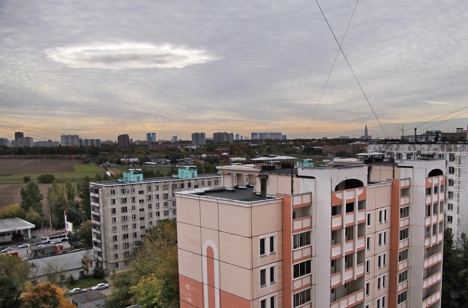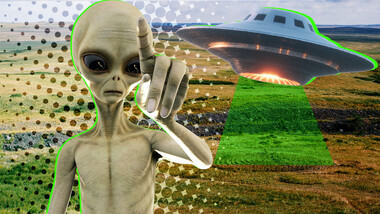Alien Nation: USSR and UFOs

For many years, reports of UFO sightings were treated in the USSR as non-science fiction not worthy of attention from serious scientists. Source: Leonid Savinov/RIA Novosti
Russian Prime Minister Dmitry Medvedev was recently asked an unusual question. A Ren TV correspondent asked him if it was true that he received a classified folder with information about UFOs along with a nuclear briefcase when he was president. The former president replied in the affirmative, adding that he was presented with a report from the secret services whose task was to control aliens on Russian territory. Not wanting to create panic, Medvedev refused to answer when asked if there were many aliens living amongst us.
The prime minister then suggested that those who were interested in the subject should watch a “documentary chronicle” called ‘Men in Black.’ Of course, one can treat this as a joke. Seriously speaking though, both in the USSR and in modern Russia, the topic of UFOs and other paranormal phenomena was and remains classified. And none of the officials will ever say anything about it publicly.
Experts who no longer hold any senior posts have more room for maneuvering and more than willing to talk. Some former high-ranking Soviet military officials have recently decided to lift the veil of secrecy on the mystery of UFOs. Revelations came in the end of March, at the Zigel Readings conference, which is named after Felix Zigel, a Soviet astronomer and mathematician who is largely credited with being the founder of UFOlogy in Russia. This biannual event has been held in Moscow for more than 20 years and is devoted to the study of paranormal phenomena.
For many years, reports of UFO sightings were treated in the USSR as non-science fiction not worthy of attention from serious scientists. Only few enthusiasts, like Felix Zigel, realized that those facts needed a serious study. In the 1960s, he delivered many public lectures on the topic, thus prompting many volunteers to join in the task of collecting information on unidentified flying objects.
The watershed moment in the officials' attitude to UFOs came in 1978, when hundreds, if not thousands, of people in Petrozavodsk for several hours witnessed a strange luminous object in the sky. The local emergencies services were inundated with letters and calls from frightened members of the public. Even neighboring countries asked the Soviet Union to explain what mysterious military exercise it was holding.
The last straw was a letter from academician Anatoly Aleksandrov, the founding father of Soviet nuclear power plants, saying that it would be a mistake to keep ignoring this issue and that it was necessary to set up special programs to study these phenomena. The source of this story is Vasily Yeremenko, a retired FSB major-general, an academician with the Academy of Security, Defense and Law and Order Issues. When Aleksandrov made such a demand, Yeremenko was in charge of the KGB division overseeing the air force and aircraft manufacturing. It was his division that was entrusted with the task of collecting all reports of UFO sightings.
By that time, Yeremenko told RIR, reports of numerous paranormal incidents had accumulated. Missile Troop units were even instructed on how to behave in the event of spotting a UFO. It was essential to not act in a way that could create an opportunity for a retaliatory aggression.
In the early 1980s, an experiment to "summon" a UFO was staged at a military range in the Astrakhan Region. By then experts had realized that UFOs were frequently sighted in areas of “heightened tension,” for instance during weapons tests or when there was a lot of military hardware gathered in one area.
“One could say that during that experiment we learnt how to summon a UFO. To achieve that, there would be a sharp increase in the number of flights performed by combat aircraft and a lot of movement of hardware. Then UFOs appeared with a probability of nearly 100 per cent,” Yeremenko said. According to him, most of them looked like luminous spheres.
With time, all the participants in the experiment got so much used to these phenomena that they took them for granted. Some even tried to make contact with those objects. “It looked like this: a person on the ground would wave their arms, twice to the right and twice to the left. The ball in the sky would react to it by swinging twice to the right and then twice to the left. We had no idea how to explain that,” Yeremenko continued.
In the end, the military, along with scientists who took part in the experiment, came to three main conclusions. First, these may be natural phenomena that modern science is not yet able to decipher. Second, these may be US or Japanese reconnaissance equipment. And, third, these may be extraterrestrial objects.
These days, UFOs have been relegated to the pages of sensationalist tabloids. That is why, Yeremenko believes, serious scientists do not dare make their attitude on this issue known and remain silent. In private conversations with pilots and cosmonauts, he has more than once heard stories of UFOs, but they do not want to speak about it publicly. Yet, the expert is convinced, this issue should be taken seriously since it is a matter of security.
Dear readers,
Our website and social media accounts are under threat of being restricted or banned, due to the current circumstances. So, to keep up with our latest content, simply do the following:
- Subscribe to our Telegram channel
- Subscribe to our weekly email newsletter
- Enable push notifications on our website
All rights reserved by Rossiyskaya Gazeta.
Subscribe
to our newsletter!
Get the week's best stories straight to your inbox
